About
My name is Eva Maria Kiss, and my teaching and research at the University of Applied Sciences Kaiserslautern focuses on database systems, machine learning, web technologies, also basic programming courses and algorithms. This website provides additional learning materials such as tutorials, quizzes and learning apps that can be used for self-study and fun.
Tutorials
In this section you find Tutorials for learning Python, MATLAB, R / RStudio, SQL / phpMyAdmin / JDBC, or C. Many tutorials have matching quizzes, this is useful to test your knowledge as part of exam preparations.
Python Tutorial »
This Python Tutorial summarizes basic syntax and usage on how to get started with Python. It is organized in ten blocks: prerequisites, installation and tools, how to create and run scripts and notebooks, how to use variables, perform calculations with operators, use if-else, loops, data structures, functions, classes, packages. To run the code examples, you can use your own Python installation with Jupyter Notebook, Visual Studio Code, Spyder ... or use one of the many available online Python environments.
Used in Machine Learning projects Algorithms CybersecurityMATLAB Tutorial »
The MATLAB tutorial gives an introduction to the MATLAB environment and language as needed by engineers for learning Numerical Methods. Basic MATLAB syntax (variables, input, output, vectors, matrices, functions, plotting) is illustrated using example scripts. After completing this tutorial, you can take a MATLAB Quiz to test your knowledge.
Used in Master's module Numerical MethodsR Tutorial »
This tutorial is an introduction to the statistical programming language R with RStudio and covers the basic syntax: variables and data types, data structures (vectors, matrices, data frames), control flow, functions, data visualization and the most important packages / libraries.
Used in Machine Learning projectsSQL-Tutorial »
Das SQL-Tutorial gibt eine kompakte Übersicht der wichtigsten SQL-Befehle, gruppiert nach Einsatzbereich: DML-Befehle zur Datenabfrage und Datenmanipulation (SELECT, INSERT, UPDATE, DELETE), DDL-Befehle zur Definition von Datenbankobjekten (CREATE, ALTER, DROP, TRUNCATE), und DCL-Befehle zur Kontrolle von Zugangsberechtigungen (GRANT, REVOKE). Zum schnellen Nachschlagen der am meisten genutzten SQL-Befehle kann direkt die SQL-Kurzreferenz verwendet werden, diese bietet eine tabellarische Übersicht mit Filter und Suche.
Used in Master's Module Database SystemsErste Schritte mit phpMyAdmin »
Das vorliegende phpMyAdmin-Tutorial gibt eine kompakte Übersicht über die Verwendung von phpMyAdmin zur Erstellung, Verwaltung und Abfrage von MySQL- bzw. MariaDB-Datenbanken. Wir verwenden dabei das XAMPP-Programmpaket, das MySQL/MariaDB und phpMyAdmin beinhaltet, und zeigen, wie die Struktur einer Datenbank (Tabellen, Integritätseinschränkungen, Sichten) mit der Benutzeroberfläche erstellt wird, wie die Datenbank über die Benutzeroberfläche und mit der Import-Funktionalität mit Daten befüllt wird, und wie Datenbank-Struktur und Inhalte mit der Export-Funktionalität exportiert werden.
Used in Master's Module Database SystemsLearning Apps
The following apps created with Python / Jupyter Notebook / Google Colab and R / Shiny can be used for learning about algorithms and data visualization. Some of the apps are work in progress, to be finished as project work by students. Have fun!
A binary search tree (BST) is a data structure used for storing, retrieving and sorting data in an efficient way
by using a binary tree structure with the property that the keys in a node’s left subtree are less and the keys in a node's
right subtree are greater than the key of the node itself, and then making it balanced.
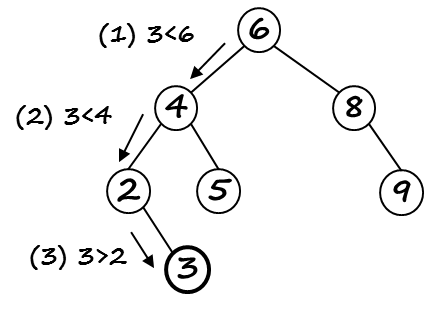
The BSTLearner tutorial explains the usage and implementation of an interactive binary search visualization in Python using Graphviz and Jupyter Notebook Widgets. Jupyter Notebook Version 1.0 BSTLearner 1.0.ipynb contains intermediate steps and test code. In Jupyter Notebook Version 1.2 BSTLearner 1.2.ipynb the classes have been moved to a Python module algolibs, so the notebook now is uncluttered and contains only the GUI / widgets code. This is work in progress! To be finished as project work by students.
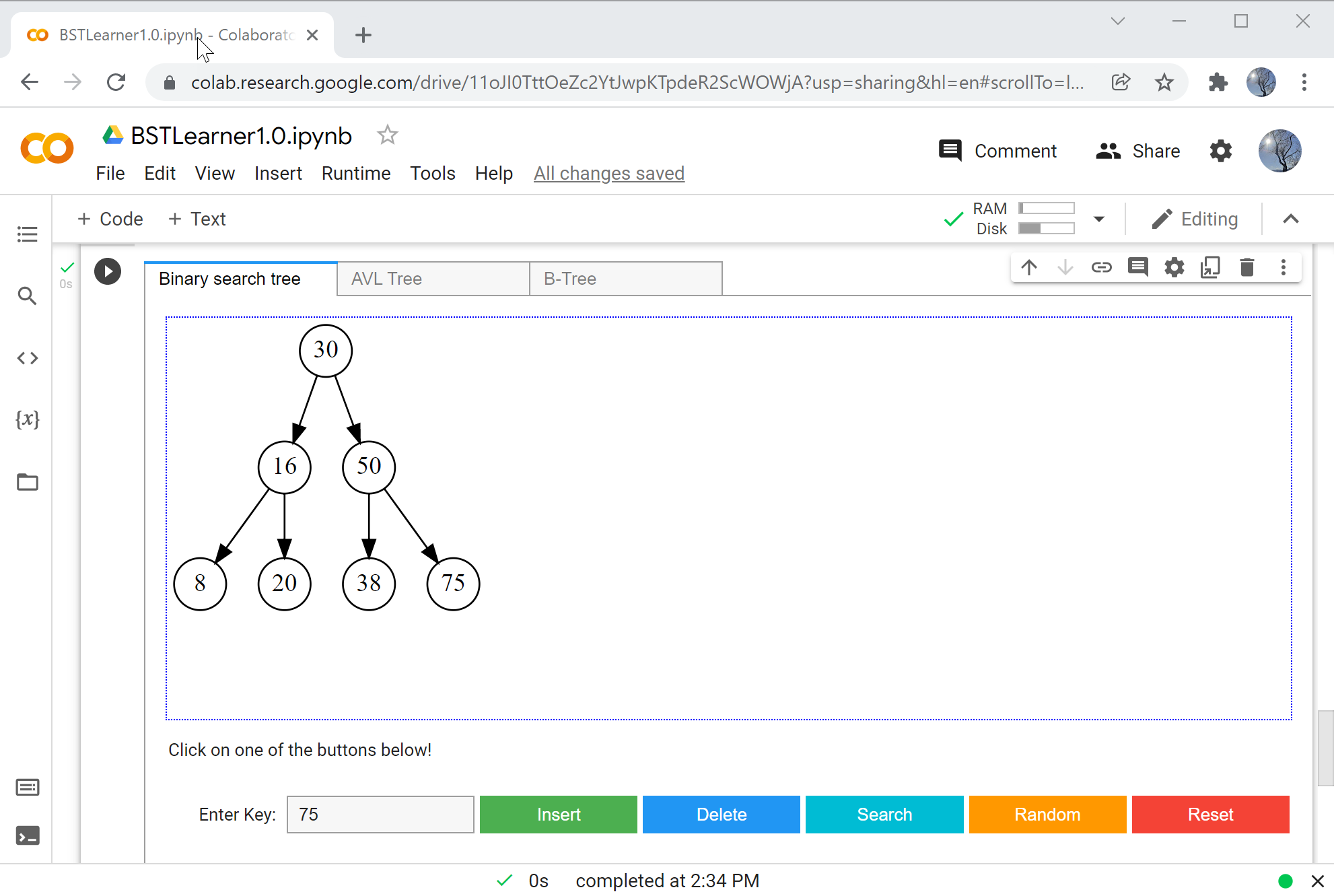
The interactive DecisionTreeLearner shows the training and usage of a decision tree model for failure prediction on a small automotive data set.
We first implemented the basic functionality of classification with Scikit-learn decision trees. Next, we created an interactive visualization of the decision tree using the Jupyter widget function interactive_output() with the aim of testing the effect of the different parameters on the performance of the model. The user interface has three tabs ("Data", "Model", and "Prediction"), each tabs has a top panel which is used to set the most important configuration parameters, and a bottom panel that shows the tabular or graphical output. Whenever a configuration parameter is changed, a new decision tree model is immediately created and visualized. Simultanously, the performance indicators for the validation data set are automatically calculated and displayed.
RVisLearner Data Visualization ggplot2 R
The interactive RVisLearner shows how to create data visualizations with the base R functions hist and plot from the graphics package, and with the corresponding functions of the Tidyverse ggplot2 package.
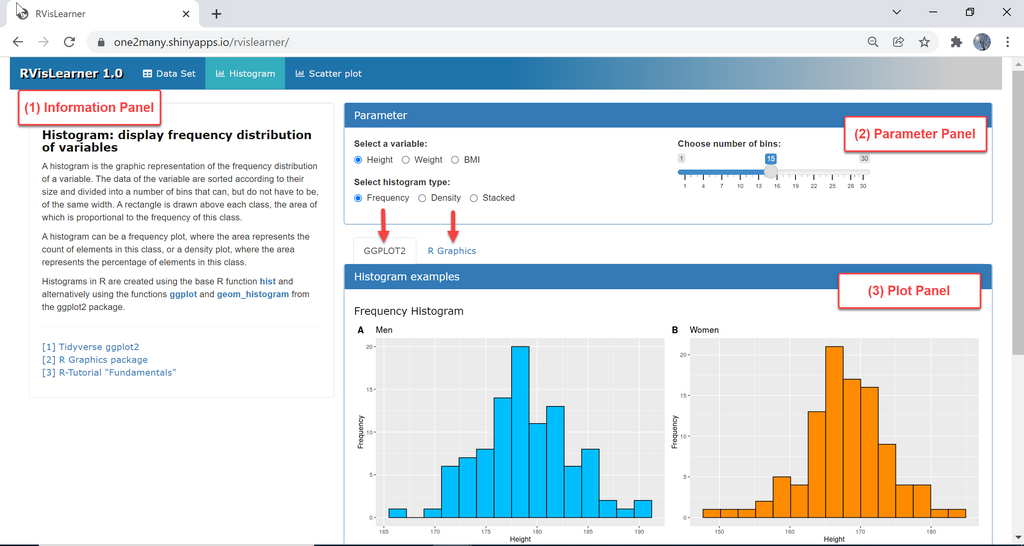
Courses & Projects
Courses
The courses listed below are open to students enrolled in the engineering programms of the University of Applied Sciences Kaiserslautern.
Algorithms »
Sorting Searching Trees Graphs Java PythonThe course Algorithms gives an introduction to algorithms and data structures as well as basic principles of algorithm design and complexity analysis. Assignments consist in extending the implementation of an existing algorithms framework in Java or Python.
Bachelor's level, Electrical Engineering, Winter termDatabase Systems »
DBMS Relational Model ER-Diagrams SQL XML JSONThe course Database Systems teaches basic concepts of databases and database management systems (DBMS), with focus on relational databases and an overview on NoSQL databases.
Master's level, Electrical Engineering, Winter termWeb Technologies and Cloud Computing »
HTML, CSS, JavaScript, PHP Web Frameworks Web Services CloudThe course Web Technologies and Cloud Computing gives an introduction to the theoretical and practical basics of modern web and cloud technologies: Internet, WWW, server and client-side programming, web frameworks: Java-based, PHP-based, Web services and service-oriented architectures, basics of cloud computing, service models and operator models.
Master's level, Electrical Engineering, Winter termNumerical Methods »
Modeling Integration ODEs PDEs MATLABThe course Numerical Methods enables students to build mathematical models for common classes of engineering problems and solve the problems by implementing appropriately chosen numerical methods in MATLAB. The focus is on solving ordinary differential equations (Euler, Runge-Kutta) and partial differential equations (finite difference and finite element methods).
Master's level, Mechanical Engineering, Summer termProjects
elab2go - Mobile Engineering Lab is an online platform for demonstrators showcasing new technologies and trends (in German). Current demonstrators and tutorials explain basics concepts and methods of Applied Machine Learning, Predictive Maintenance, and Internet of Things. The platform is developed as part of the "Offene Digitalisierungsallianz Pfalz"-Project, and aims to transfer innovation and trend technologies from universities in the Rhineland-Palatinate region.
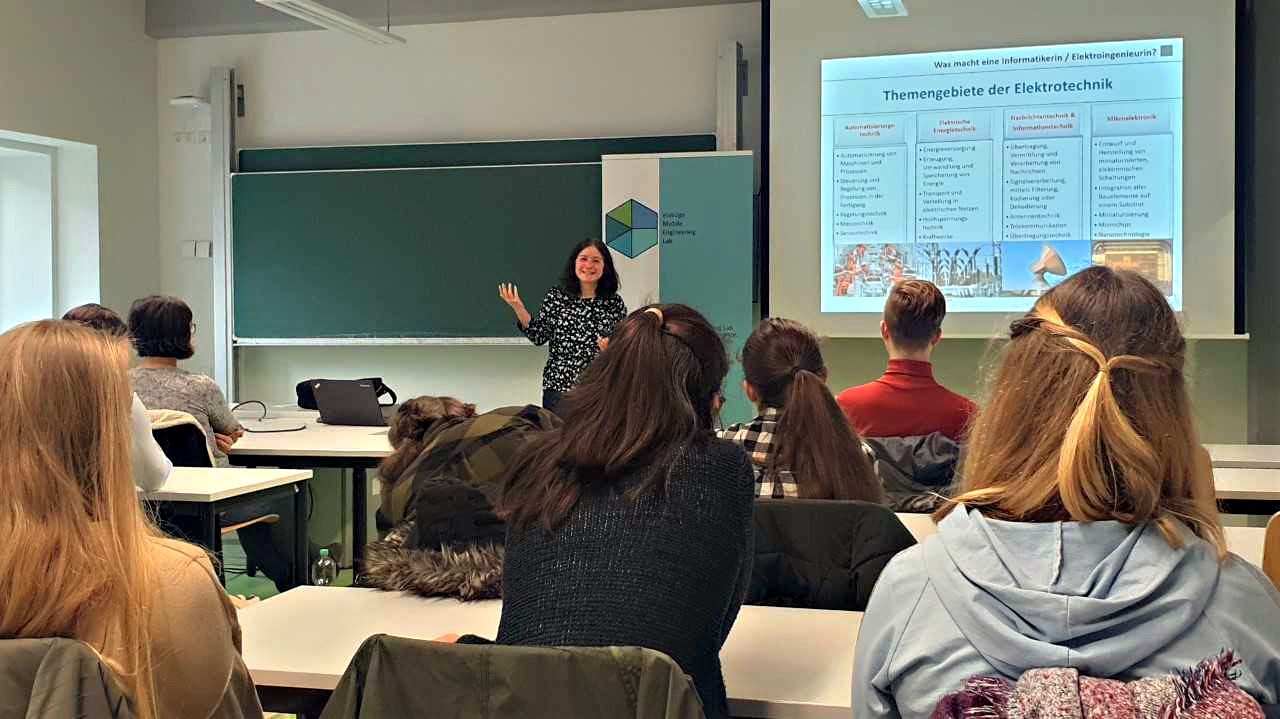
The series of demonstrators and tutorials Demo-PYx introduces to models and algorithms of Machine Learning, e.g. Decision Trees, Cluster Analysis, Artificial Neural Networks) by using Python as programming language, the Python-packages for data analysis Pandas, Scikit-Learn, Keras, Tensorflow, and Jupyter Notebook or Google Colab as web-based IDE.
The survey article Machine Learning: Concepts, Methods, Tools gives an introduction to the most important concepts of machine learning and explains the use of the elab2go demonstrators that illustrate them.
The survey article An introduction to Predictive Maintenance explains the fundamental concepts and basic technologies of predictive maintenance, as well as their areas of application in practice, solutions of global players and an overview of the elab2go demonstrators that illustrate data analysis as part of Predictive Maintenance process.
University of Applied Sciences Kaiserslautern
The Department of Applied Engineering (AING) offers students the opportunity to pursue an exceptional, high quality education in the largest electrical and mechanical engineering department in Rhineland-Palatinate.
Events
Open Campus 2026
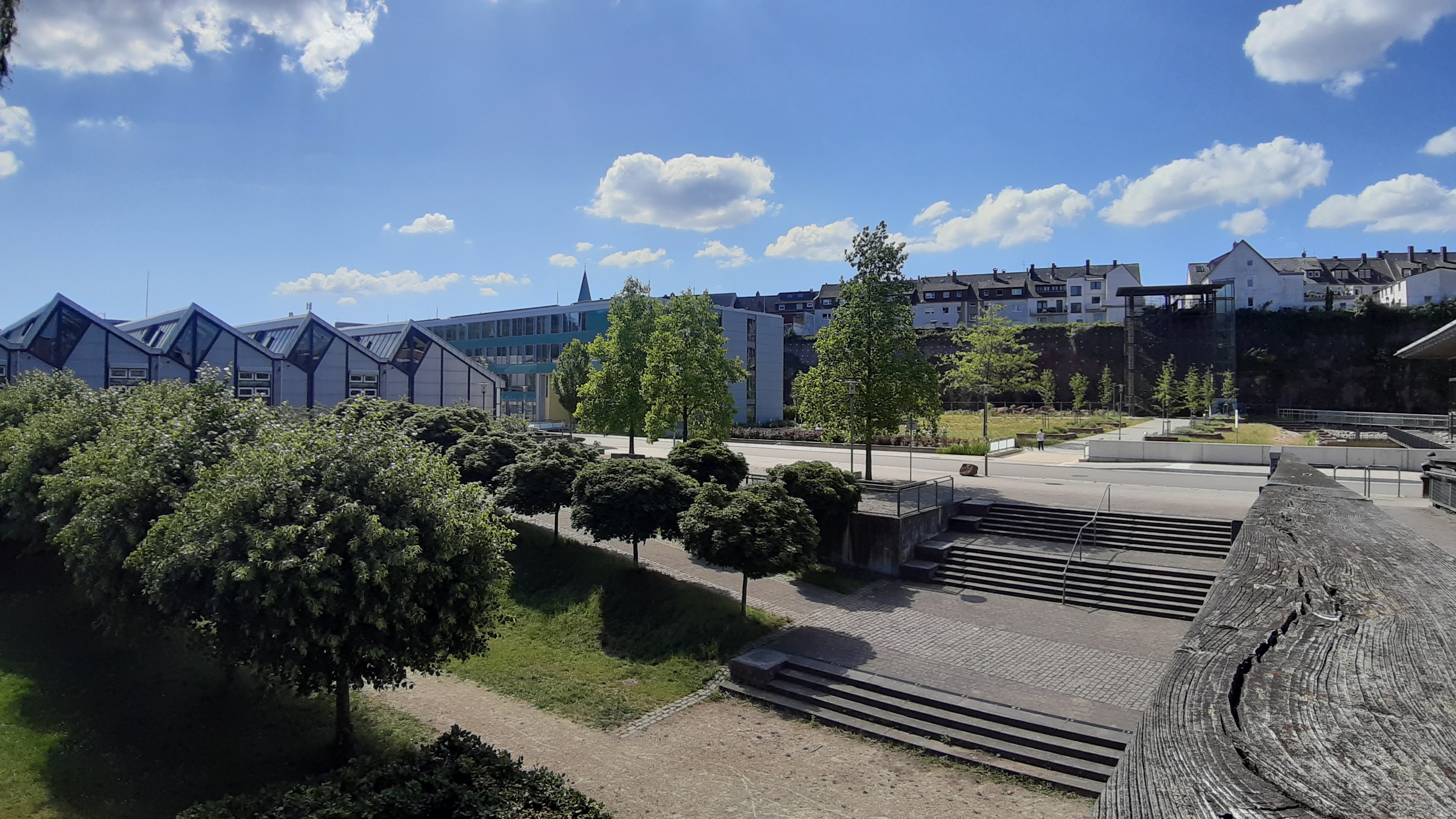
As every year, the University of Applied Sciences Kaiserslautern invites to an Open Campus event, in 2026
for Thursday, April 16, 15:00 to 22:00.
The event is open to the general public and offers a good opportunity for prospective students to learn about the courses and study conditions
at our university.
You get to know the university directly on site and find out first-hand information
about the degree programs and student life at the university.
Weather in Kaiserslautern, now vs. then
08.01.2026 / 08.01.2020 / 08.01.2010
Curious about recent weather patterns in Kaiserslautern? Use the interactive charts to compare temperature profiles for the last 15 years.